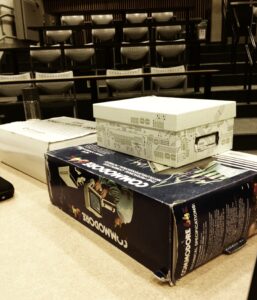It takes a village to teach intro to DH.
I firmly believe that digital humanities is a team sport where faculty, technologists, and librarians play an equal part. This orientation is especially true in my intro to dh course.
This semester, Jim and I have been lucky that many of our colleagues from the other Five Colleges graciously agreed to visit our course. Kelcy Shepherd from Amherst College delivered a hybrid lecture/workshop about text mark-up; Shaun Trujillo from Mount Holyoke College showed us the nuts and bolts of digital forensics and facilitated a wonderful discussion of new media; Jon Caris from Smith College & Mike Olkin from the Town of Amherst introduced to spatial analysis and mapping; and my colleague Thea Atwood evangelized about the importance of data management for scientists and humanists alike. We also took advantage of other speakers who traveled to Hampshire who were gracious enough to meet our class – looking at you, Alex Gil (#transformdh) and Benjamin Maco Hill (open access).
The presentations opened me up to new questions, introduced me to new ways of knowing, and pointed out new skills I needed to learn, other questions to consider. My understanding of digital humanities is stronger from these visits.

However, can all digital humanities survey courses sustain a roster of amazing, face to face, guest speakers from semester to semester? In our era of the MOOC and neat digital tools, how can we leverage social networks and educational technology to bring awesome presenters into classes remotely? Should the dh community compile a list of willing and able specialists who would lend a lecture or demo to dh courses via the internet? What say you, Eduhacker community?
